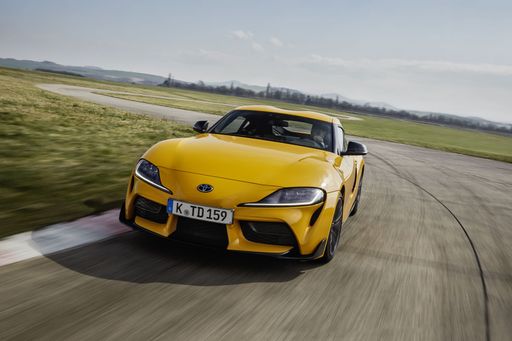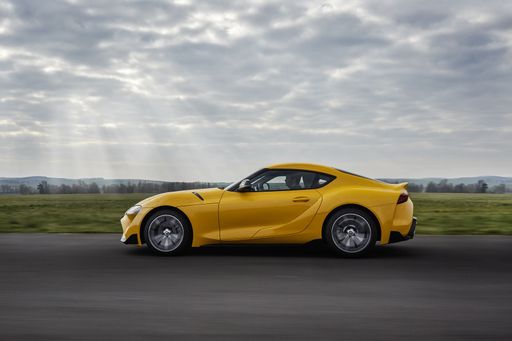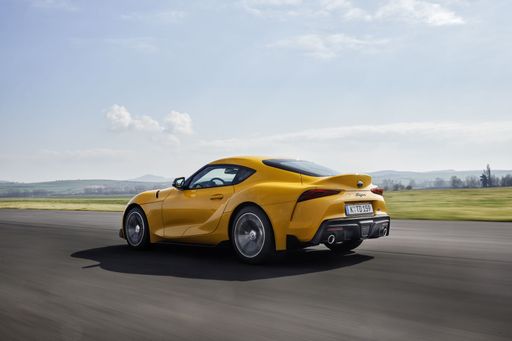Toyota Supra vs Toyota Prius – Differences & prices compared
Compare performance, boot space, consumption and price in one view.
Find out now: which car is the better choice for you – Toyota Supra or Toyota Prius?
The Toyota Supra (Coupe) comes with a Petrol engine and Automatic or Manuel transmission. In comparison, the Toyota Prius (Hatchback) features a Plugin Hybrid engine with Automatic transmission.
When it comes to boot capacity, the Toyota Supra offers 290 L, while the Toyota Prius provides 284 L – depending on how much space you need. If you’re looking for more power, decide whether the 441 HP of the Toyota Supra or the 223 HP of the Toyota Prius suits your needs better.
In terms of consumption, the values are 7.10 L per 100 km for the Toyota Supra, and 0.50 L for the Toyota Prius.
Price-wise, the Toyota Supra starts at 54200 £, while the Toyota Prius is available from 39400 £. Compare all the details and find out which model fits your lifestyle best!
Toyota Supra
The Toyota Supra stands as an iconic symbol in the world of sports cars, blending striking aesthetics with performance. Its sleek design and elegant curves capture attention, while the finely tuned engine offers an exhilarating driving experience. Inside, the driver-focused cockpit combines luxury with cutting-edge technology, ensuring both comfort and excitement on the road.
details @ toyota-media.de
@ toyota-media.de
 @ toyota-media.de
@ toyota-media.de
 @ toyota-media.de
@ toyota-media.de
Toyota Prius
The Toyota Prius stands as a pioneer in the realm of hybrid vehicles, offering an eco-friendly driving alternative with its innovative technology. Its aerodynamic design and comfortable interior make it a practical choice for those looking to reduce their carbon footprint without sacrificing style. Additionally, the Prius boasts a reputation for reliability and efficiency, contributing to its lasting popularity among environmentally conscious drivers.
details @ Toyota
@ Toyota
 @ Toyota
@ Toyota
 @ Toyota
@ Toyota
 @ Toyota
@ Toyota

|

|
|
|
|
Costs and Consumption |
|
|---|---|
|
Price
54200 - 122400 £
|
Price
39400 - 45800 £
|
|
Consumption L/100km
7.1 - 9 L
|
Consumption L/100km
0.5 - 0.7 L
|
|
Consumption kWh/100km
-
|
Consumption kWh/100km
-
|
|
Electric Range
-
|
Electric Range
72 - 86 km
|
|
Battery Capacity
-
|
Battery Capacity
-
|
|
co2
161 - 204 g/km
|
co2
12 - 17 g/km
|
|
Fuel tank capacity
52 L
|
Fuel tank capacity
40 L
|
Dimensions and Body |
|
|---|---|
|
Body Type
Coupe
|
Body Type
Hatchback
|
|
Seats
2
|
Seats
5
|
|
Doors
3
|
Doors
5
|
|
Curb weight
1395 - 1580 kg
|
Curb weight
1620 - 1630 kg
|
|
Trunk capacity
290 L
|
Trunk capacity
284 L
|
|
Length
4379 mm
|
Length
4599 mm
|
|
Width
1854 - 1867 mm
|
Width
1782 mm
|
|
Height
1276 - 1292 mm
|
Height
1470 mm
|
|
Payload
215 - 315 kg
|
Payload
365 - 375 kg
|
Engine and Performance |
|
|---|---|
|
Engine Type
Petrol
|
Engine Type
Plugin Hybrid
|
|
Transmission
Automatic, Manuel
|
Transmission
Automatic
|
|
Transmission Detail
Automatic Gearbox, Manual Gearbox
|
Transmission Detail
-
|
|
Drive Type
Rear-Wheel Drive
|
Drive Type
Front-Wheel Drive
|
|
Power HP
258 - 441 HP
|
Power HP
223 HP
|
|
Acceleration 0-100km/h
4.3 - 5.2 s
|
Acceleration 0-100km/h
6.80 s
|
|
Max Speed
250 - 275 km/h
|
Max Speed
177 km/h
|
|
Torque
400 - 571 Nm
|
Torque
-
|
|
Number of Cylinders
4 - 6
|
Number of Cylinders
4
|
|
Power kW
190 - 324 kW
|
Power kW
164 kW
|
|
Engine capacity
1998 - 2998 cm3
|
Engine capacity
1998 cm3
|
General |
|
|---|---|
|
Model Year
2024 - 2025
|
Model Year
2023
|
|
CO2 Efficiency Class
F, G
|
CO2 Efficiency Class
B
|
|
Brand
Toyota
|
Brand
Toyota
|
Toyota Supra
A Revitalised Icon: The Toyota Supra
The Toyota Supra has been a byword for performance and style since its inception. In its latest iteration, the Supra continues to captivate automotive enthusiasts with its blend of heritage and modern innovation. With a stunning profile and state-of-the-art engineering, the Toyota Supra is more than just a sports car; it’s a testament to Toyota’s commitment to excellence.
Engineering Excellence Under the Hood
At the heart of the Toyota Supra lies a sophisticated 2.0-litre turbocharged four-cylinder engine. This power unit, with a displacement of 1998 cm3, provides a thrilling 258 PS (190 kW) and an impressive torque output of 400 Nm. Such output doesn’t come at the cost of efficiency, as the Supra’s fuel consumption stands at an economical 7.1 L/100 km, supported by an automatic transmission that emphasises smooth power delivery and driving comfort.
Driving Dynamics and Performance
Driving the Toyota Supra is an experience defined by precision and agility. With an acceleration from 0 to 100 km/h in just 5.2 seconds and a maximum speed of 250 km/h, the Supra emboldens its driver with confidence. The rear-wheel-drive layout provides dynamic prowess, ensuring a well-balanced and responsive performance on both straight roads and winding tracks.
Design: A Nod to Tradition with Modern Flair
The design of the Toyota Supra is a harmonious blend of old and new. Its coupe silhouette is characterised by sleek lines and an assertive stance, true to its sports car roots. Measuring 4379 mm in length, 1854 mm in width, and 1292 mm in height, the Supra asserts itself with a compact yet muscular profile. The bold aesthetics are complemented by innovative features that emphasise aerodynamics and driving stability.
Safety and Technological Innovations
Toyota embeds cutting-edge technology within the Supra to enhance driver and passenger safety. Modern connectivity options, driver-assistance systems, and a CO2 efficiency class of F reflect Toyota’s dedication to integrating technology without compromising performance. The Supra’s technologically advanced cockpit connects seamlessly with today’s demand for a digitally proficient driving environment.
Comfort and Practicality
Despite its focus on performance, the Toyota Supra does not neglect practicality. Offering a surprisingly spacious 290 litres of boot space and a tank size of 52 litres, it accommodates both the need for speed and everyday usability. The interior craftsmanship prioritises comfort, ensuring that the Supra remains a suitable companion for both the daily commute and longer escapades.
Conclusion: An Icon Reimagined for the Future
The Toyota Supra stands out not only as a reborn icon but as a forward-thinking sports car that embodies Toyota’s innovative spirit. With a range of options such as the Dynamic Automatik and Pure Automatik trims, the Supra offers tailored experiences for its discerning audience. Ultimately, this modern legend continues to inspire car lovers, representing a perfect harmony of heritage and innovation.
Toyota Prius
The All-New Toyota Prius: Revolutionising Efficiency and Performance
The Toyota Prius, a name synonymous with hybrid innovation, has once again shown why it remains at the forefront of eco-friendly automotive technology. The latest models have enhanced technical features and innovations, setting new standards for efficiency and driving experience.
Hybrid Performance: A Leap Forward
The latest Prius models employ a sophisticated 2.0 litre Plug-in Hybrid system that flawlessly melds petrol and electric power. With a power output of 223 PS, it propels the Prius with impressive dynamism, reaching 0-100 km/h in just 6.8 seconds. This performance-oriented aspect of the Prius does not compromise on efficiency, with an astonishing fuel consumption ranging from 0.5 to 0.7 L/100km.
Electric Range and Efficiency
One of the key highlights of the new Prius is its substantial electric-only range. Depending on the variant, it can travel between 72 to 86 km on electric power alone, making it an ideal choice for urban commutes where zero emissions are preferred. The hybrid system's CO2 emissions are remarkably low, between 12 and 17 g/km, contributing to its CO2 Efficiency Class B rating.
Engineering Excellence with CVT
The Prius is equipped with a state-of-the-art Continuously Variable Transmission (CVT), ensuring a smooth and efficient drive. This advanced transmission supports the front-wheel-drive layout, delivering power seamlessly and enhancing driving pleasure without sacrificing fuel economy.
Stylish Design and Comfort
Designed as a sleek five-door hatchback, the Prius offers a comfortable and spacious interior with seating for five passengers. It measures 4599 mm in length, 1782 mm in width, and 1470 mm in height, offering a practical balance of size and comfort. The boot space, while tailored for the hybrid battery, still provides a decent 284 litres of storage.
Cost Efficiency
The running costs of the Prius are competitive, with monthly expenses estimated between €1064 and €1188, and cost per kilometre ranging from 42.6 to 47.5 cents. Its efficient design results in a maximum speed of 177 km/h and a practical fuel tank size of 40 litres, ensuring less frequent stops on longer journeys.
Conclusion: The Prius Legacy Continues
The Toyota Prius continues to lead by example in the realm of hybrid technology. Combining impressive power with unmatched efficiency and a sophisticated driving experience, it is clear that the Prius remains a compelling choice for the environmentally conscious driver. Its innovative features and favourable cost metrics only bolster its appeal in the modern automotive landscape.
Which drive types are available for the Toyota Supra?
Available as Rear-Wheel Drive.
The prices and data displayed are estimates based on German list prices and may vary by country. This information is not legally binding.
